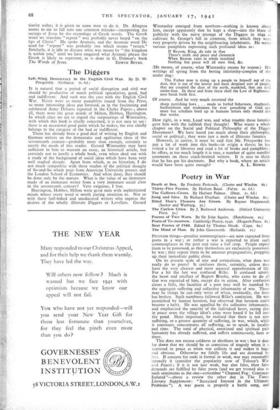The Diggers
Left-Wing Democracy in the English Civil War. By D. W. Petegorsky. (Gollancz. 7s. 6d.)
IT is natural that a period of social disruption and civil war should be productive of much political speculation, good, bad and indifferent. And such was the case with the English Civil War. Never were so many pamphlets issued from the- Press, so many interesting ideas put forward, as in the fascinating and celebrated Army Debates reported in the Clarke Papers ; above all, there were the great minds of Milton, Hobbes, Harrington. In which class we are to regard the outpourings of Winstanley, with which this book is chiefly concerned, it is not easy to say : there is an occasional good point which he makes, the rest chiefly belongs to the category of the bad or indifferent.
There has already been a good deal of writing by English and German writers on the democratic and egalitarian ideas of the seventeenth century—probably more than enough, certainly to satisfy the needs of this reader. Gerard Winstanley may have sufficient in him to warrant an essay, an historical article, but certainly not to justify a whole book, even when eked out with a study of the background of social ideas which have been very well studied already. Apart from which, as an historian, I do not much sympathise with these studies of the political thought
of So-and-So which pour from American University presses and the London School of Economics. And when done, they should be done only by the mature. What is the value of an immature study of an immature writer from a very immature social class in the seventeenth century? Very exiguous, I fear.
Harrington, Hobbes, Milton were great men with sophisticated minds whose every word is worth paying attention to. Not so with these half-baked and uneducated writers who express the desires of the wholly illiterate Diggers or Levellers. Gerard
Winstanley emerged from nowhere—nothing is known about him, except apparently that he kept a shop—into the blare of publicity with the naive attempt of the Diggers in 1649 to cultivate St. George's hill in common, from which they were very properly driven by the neighbouring inhabitants. He wrote various pamphlets expressing such profound ideas as : If Reason, King, do rule in thee There's truth and peace and clemencie When Reason rules in whole -mankind Nothing but peace will all men find, &c.
(He means, of course, what Winstanley means by reason.) His writings all spring from the boring inferiority-complex of the under dog:
The Father now is rising up a people to himself out of the dust, that is out of the lowest and most despised sort of people, that are counted the dust of the earth, mankind, that are trod under-foot. In these and from these shall the Law of Righteous- ness break forth first.
Of course. And he very much resented the
sharp punishing laws . . . made to forbid fishermen, shepherds, husbandmen and tradesmen for ever preaching of God any more but schollars bred up in humane letters only should doe that worke.
How right, in a way, Laud was, and what trouble these lunatics gave him with the rubbish they thought! Who wants a whole chapter on the Social and Political Philosophy of the Digger Movement? We have heard too much about their philosophy, social or political; they were just a mob of illiterate fanatics.
However, in justice, it must be said that Mr. Petegorsky has put a lot of work into this book—in origin a thesis; he has visited a lot of libraries and read a lot of books and pamphlets ; he offers, at too much length it is true, a number of quite sensible comments on these crack-brained writers. It is nice to think that he has got his doctorate. But why a book, where an article would have been quite enough? A. L. ROWSE.






























 Previous page
Previous page